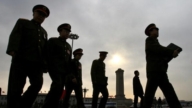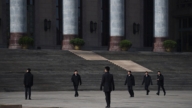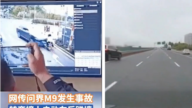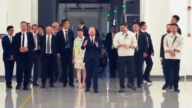【新唐人2013年07月08日讯】最近在中国的金融领域,一些智库和商业银行应中共国务院之邀,已经提交了十多个改革方案,而各种讨论和研讨会也在密集召开。有大陆媒体传出,为了研究方案,中共一名副总理,甚至在早晨5点召集大家开会。专家指出,当局相继出炉的扩大民间资本进入金融业,以及推进利率市场化改革等,都说明中国的金融危机已经到了火烧眉毛的程度。那么,中共领导人的这种努力能解决问题吗﹖中国金融危机的症结在哪里呢﹖我们来看看专家的分析。
中共日前发布的一份公告显示,中共将推进利率市场化改革,同时中共国务院办公厅发布了《关于金融支持经济结构调整和转型升级的指导意见》,明确提出“扩大民间资本进入金融业”。
美国南卡罗莱纳大学艾肯商学院教授谢田:“实际上是钱荒之际,中共措手不及,不得不向民间求助的办法。但是从中共的本质上我们可以认定,它不会真正的让民间资本进入银行,起到控股的作用,最多让民间资本参股, 只是在利用老百姓的钱,但不会给老百姓权利。”
谢田说,也不能排除中共利益集团,利用民间资本进入银行业的机会,把从国有银行贪污的钱,以民间资本出现,这样,就再一次方便了他们把国有财产转变成私有财产。
谢田指出,中共恐惧一旦失去对中国经济的控制,就会失去了对中国的控制,因而不会彻底的市场化。谢田说,前一阵,中国出现“钱荒”时,中共新政又急忙拿出5个亿出来救市,就是很好的佐证。
北京大学经济学教授夏业良:“中国金融系统是有很脆弱的一些特征,出现这样的钱荒,就说明它的市场化的程度是很低的,因为在一个市场开放的体系中,它的流动性是很重要的,假如说流动性出现很大的问题,就说明这个金融系统存在着系统性的问题。”
谢田还表示,中国现在面临的经济困境,正是因为中共当年搞所谓经济自由化时,没有引进资本主义自由经济中的“公平竞争”、“法治”,以及“媒体监督”等机制造成的。
谢田:“我们现在看到的中国发生的危机,经济危机,包括金融危机,实际上就是中共的独裁和市场化发生矛盾的时刻,现在推行利率的市场化,不改变政治体制和整个社会体制,可以肯定是走不远的。”
最近媒体出现了一个新名字“李克强经济学”。有人诠释李克强经济学政策的框架,关键点是“无刺激”、“去杠杆”和“结构改革”,也就是说,让中国经济重回市场的轨道。
谢田:“我们要问的一点是,他是为什么在做?如果是为救党的话,注定他是走不下去的,因为如果有共产党利益在其中这样一个前提,他不会真正为中国人民着想,也不会真正解决中国现在的问题。救中国祇有打破共产党的一党独裁和专政的体制才能实现,这样,中国的金融才能有新的希望。”
中共国务院宣布允许私人资本进入银行业的同时,还公开表明,民营银行将自担风险,并且将由银监会、中国人民银行、工商总局和法制办等组成工作机构,负责具体事宜。
谢田指出,这种做法与中共对国有银行有了危机时总是慷慨解囊,形成鲜明对比,也说明﹕中共不是真正欢迎民营金融机构。谢田表示,也正因为中共对国有银行的过分宠爱,才造成国有银行敢于乱来。
谢田还指出,在美国等民主国家,所有银行都是私人银行,因为有银行储蓄保险公司和政府担保与监管,老百姓的存款就不会出现问题。
采访编辑/刘惠 后制/萧宇
China’s Financial Crisis – A Desperate Situation
Over a dozen financial reform plans have reportedly
been brainstormed for China’s State Council.
Many discussions and seminars have also been
held over the past days.
Media have reported that a deputy premier even
held a meeting at 5:00 am to find a solution.
The Chinese Communist Party (CCP) authorities
have recently given private capital access to the financial sector.
Also, it has boosted a reform of market-oriented
interest rates.
Expert say that all these signify that China’s
financial crisis has been desperate.
Will these approaches help the CCP to
settle problems?
Where is the crux of China’s financial crisis?
Let’s see what experts are saying about the issue.
The CCP authorities have declared they will push
forward interest rate liberalization reform.
The State Council has released guidance
on financial support for economic restructuring and transformation.
It specifically mentions to “expand private capital
into the financial sector.”
(Prof. Univ. of South Carolina –Aiken) Xie Tian:
“The CCP was caught unprepared by the banks’ shortage of money.
So this is a way for it to use private capital.
But we’re sure that the CCP’s nature decides that
it won’t really allow private capital to develop a predominant sharehold in the banks.
Private capital may hold partial ownership at most.
be blunt, this helps the CCP to use private money,
but it won’t give the populace real rights.”
CCP interest groups may also exploit the opportunity,
says Xie Tian.
That is, they inject the embezzled money from state
owned banks, but under the name of private capital.
A good way for them to transform state assets
into their own private property.
Xie Tian notes that the CCP fears losing control of
the economy, as it is the core of its control over China.
So, the regime won’t implement a full market operation.
The new CCP administration’s hasty pump of
500 million yuan,
which was intended to ease the recent
money shortage, has proved this, he says.
(Prof. of Economics, Peking University)Xia Yeliang:
“China’s financial system is fragile.
The money shortage shows a low level of marketization.
For a liberal system, liquidity is very important.
An occurrence of liquidity problems signals
systemic problems in financial sector.”
According to Xie Tian, China’s current economic
plight is due to a lack of “fair competition”,
“rule of law” and “watchdog journalism”.
These mechanisms weren’t introduced when the CCP
implemented the so-called economic liberalization.
Xie Tian: “Now China’s crises have occurred
in economy and in finance.
In fact, this is the moment when the dictatorship
clashes with the market forces.
Its interest rate liberalization reform definitely won’t
succeed, if the political system remains unchanged.”
China’s media has recently coined a new term,
“Li Keqiang Economics”.
It is interpreted with features of “no-stimulus”,
“deleveraging” and “structural reforms”.
That is, letting China’s economy get back
on the track of marketization.
Xie Tian: “The question is why he is doing so?
If he wants to use this measure to save the CCP,
it’s doomed to failure.
This is because it premises the existence of
CCP interest groups.
That makes him unable to truly think about
the interests of the Chinese people,
and neither can it really solve current problems in China.
The only solution to save China is to
get rid of the CCP’s dictatorial regime.
That’s the only way to bring new hope
for China’s financial system.”
The regime has also stated that private banks
shall be responsible for taking their own risks.
The formation of private financial institutions
will be under the leadership of a joint state agency.
Xie Tian indicates that the approach has formed
a sharp contrast to previous official cash injections in solving the state-owned banks’ crises.
This is also a reminder that that the CCP has
never truly welcomed private financial institutions.
Xie Tian points out that the CCP’s long-term pampering
has encouraged the state-owned banks reckless behavior.
Xie Tian mentions that in the US and in other
democratic countries, all banks are private.
Federal Deposit Insurance companies protect
local citizens against losses in case of bank failure.

























